'Modi skillfully navigated Trump's ego and pushed the right buttons.'
'Critics assailed Modi's speech for its personalism, but in the Trump era this is par for the course.'
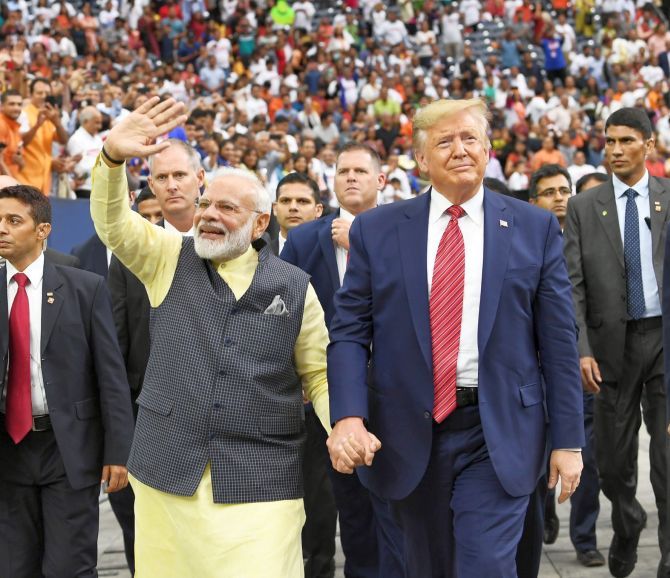
"'America First' and 'Make in India' are in tension with one another. At present, the strategic and defence relationship is carrying a heavy part of the load and the government-to-government dimension of the economic relationship is lagging behind," Milan Vaishnav, director of the South Asia program and senior fellow at the Carnegie Endowment for International Peace in Washington, DC, tells Rediff.com's Archana Masih.
What do you make of the Trump-Modi bonhomie in Houston? What does it indicate about the arc of the India-US relationship and its evolution -- from a Democratic administration to a Republican one over the years?
I would say that Modi did his homework on Trump. The key to Trump's heart is flattery and Modi buttered him up big time.
From name-checking his book, Art of the Deal to surfacing the quip, 'Ab ki baar, Trump sarkar', Modi explicitly played to Trump's vanity.
Surprisingly, Trump was extremely restrained in his remarks. He stuck to the script and heralded what both countries would like to achieve on trade, immigration, and foreign policy (namely, countering terrorism).
The basis of the relationship is strategic and long-term, but Modi skillfully navigated Trump's ego and pushed the right buttons.
Critics assailed Modi's speech for its personalism, but in the Trump era this is par for the course frankly.
This was the first time an Indian prime minister has endorsed a US president, what implication is this likely to have? Especially if Trump fails to secure a second term.
I have a slightly different take on this. If you actually go back and hear what the prime minister said, he seems to be making a reference to a line that Trump himself used in a 2016 campaign ad: 'Ab ki baar, Trump sarkar.'
Some have chosen to view this as an endorsement of Trump in 2020, but I am not so sure that was Modi's intention. If it was, then it would be an incredibly short-sighted move on the part of the PM.
If the Democrats were to win in 2020, no doubt the PM would say that the US-India partnership extends beyond any one head of government or any one party on either side of the Atlantic.
What did President Trump aim to gain from this appearance with Prime Minister Modi? What did Prime Minister Modi hope to gain?
For starters, I am not sure Trump has ever seen a captive audience of 50,000 Americans that he could resist.
More seriously though, I think Trump had at three motives.
First, Texas is an increasingly 'purple state' and this essentially was a free campaign appearance for the president. By standing shoulder-to-shoulder with an Indian PM, he was making a play for the votes of Indian Americans who account for one percent of the US population (but have historically been among the most loyal supporters of the Democratic party).
Second, Trump and Modi both wanted to signal to their own domestic constituencies that the US-India partnership transcends any routine irritants or differences that might exist in the day-to-day relationship -- issues like trade, immigration, and the like.
Modi had three additional objectives. First, this was an opportunity to really signal to the global community that India is a major player on the world stage.
When you can hold a rally for 50,000 people on American soil and have the American president show up, this is a powerful symbol.
Second, Modi also wants to tap into the Indian-American community, which is a provider or remittances, investment, and support for the prime minister's vision back home.
The Diaspora would like a strong, less corrupt, more efficient government in India -- and many in the Diaspora believe Modi can deliver this change. There is an alignment of visions here.
Third and finally, this was a subtle power play for US domestic political consumption. Indian Americans are an increasingly important force in American society and Modi showed that they are a force to be reckoned with, not to mention a force that he can also tap into to further Indian interests and deepen US-Indian relations.
How do you think the Howdy Modi event and President Trump's praise for Modi will be received in Pakistan and China?
China is often the subtext of US-India bonhomie. Undoubtedly, Beijing was watching nervously as the US president and Indian PM held hands and paraded around the stage.
For Modi, Trump's presence was a validation of his policies at home -- whether on Assam or Jammu and Kashmir or the economy.
I am sure Pakistan too took notice, especially given Modi's sharp language on Pakistan (though he never referred to the country by name) and his calls for a bilateral partnership against terrorism.
Some of this anxiety in Islamabad may have dissipated after Imran Khan's warm meeting with Trump on the sidelines of the UN general assembly the very next day where Trump had praise for Khan and once more volunteered, if both sides agreed, to mediate the Kashmir dispute.
We expected a declaration of an India-US trade deal when President Trump spoke. Clearly, both sides, who were said to be working hard at achieving a deal before Houston, are further apart than what was surmised.
In your opinion, what are the thorny issues in achieving a trade deal and removing the irritants in the relationship?
Typically, these big pronouncements come before or after these bilateral meetings. This is the course of things in US-Indian relations.
It is really impossible to know what is happening behind the scenes, but the rumour mill is strong that we will see at least a minor US-India trade deal in which India will make concessions on price caps on medical devices, expand access to US agricultural exports, and roll back tariffs on electronics in exchange for reinstatement of unilateral trade preferences under the GSP (Generalised System of Preferences) programme.
To be sure, this does not eliminate the thorns in the side of the relationship. But it does give confidence that both sides are working in earnest and that political attention from the top can help drive solutions.
Since President Trump is known to be unpredictable and has offered to mediate on Kashmir before -- Will President Trump try to get Prime Ministers Modi and Khan talking soon?
I doubt even Trump has delusions that he can achieve a rapprochement between India and Pakistan. Whenever the subject comes up, he inevitably talks about how intractable the issue is and how long it has been going on.
Trump desperately wants global recognition -- not to mention a Nobel Peace Prize -- but even he knows he is unlikely to find one on these grounds.
Do you believe the India-US relationship can only get better hereon? What do you expect will happen in the short-term? In the long-term?
I think we are in dangerous territory if we start taking progress for granted. There is no doubt that there has been significant and steady progress since 2000.
For the last two decades, governments of all stripes -- in Delhi and in Washington -- have worked towards strengthening and broadening ties.
We are not out of the woods though. 'America First' and 'Make in India' are in tension with one another.
At present, the strategic and defence relationship is carrying a heavy part of the load and the government-to-government dimension of the economic relationship is lagging behind (private financial flows continue regardless).
There is no guarantee that, left unchecked, the economic issues would not spill over to the strategic side of the house. This is especially likely if the Indian economy experiences a protracted growth slowdown.
Did Trump's appearance alongside Modi restore the equilibrium in a relationship that had been on a downward spiral for the last year or so?
I think it certainly took away many of the negative talking points, even if it did not change the fundamentals. The US-India relationship is never as great -- or as bad -- as its supporters or detractors make it out to be.
Cheerleading and naysaying are two great traditions in world capitals -- Delhi and Washington are no exception to that rule.
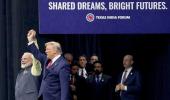
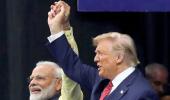
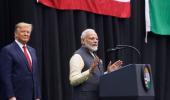
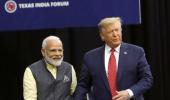
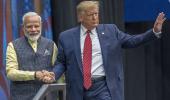




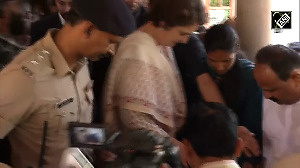
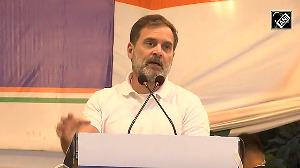
 © 2025
© 2025